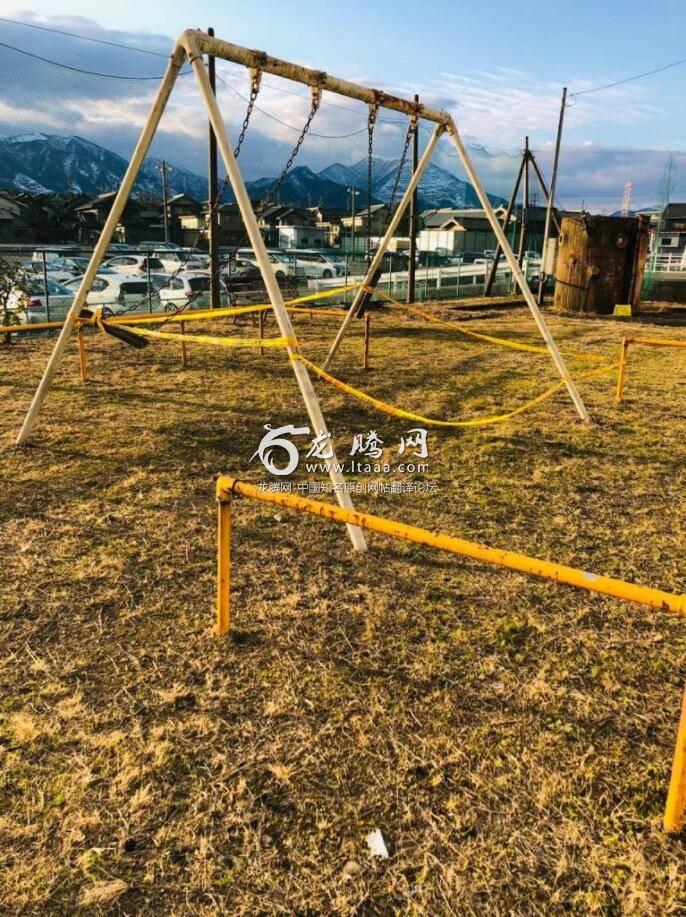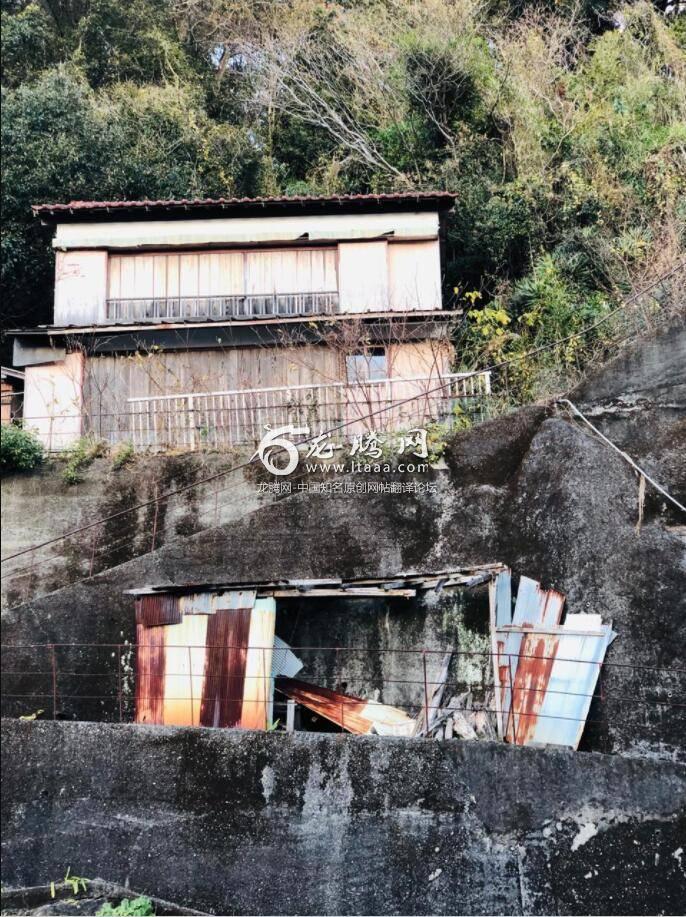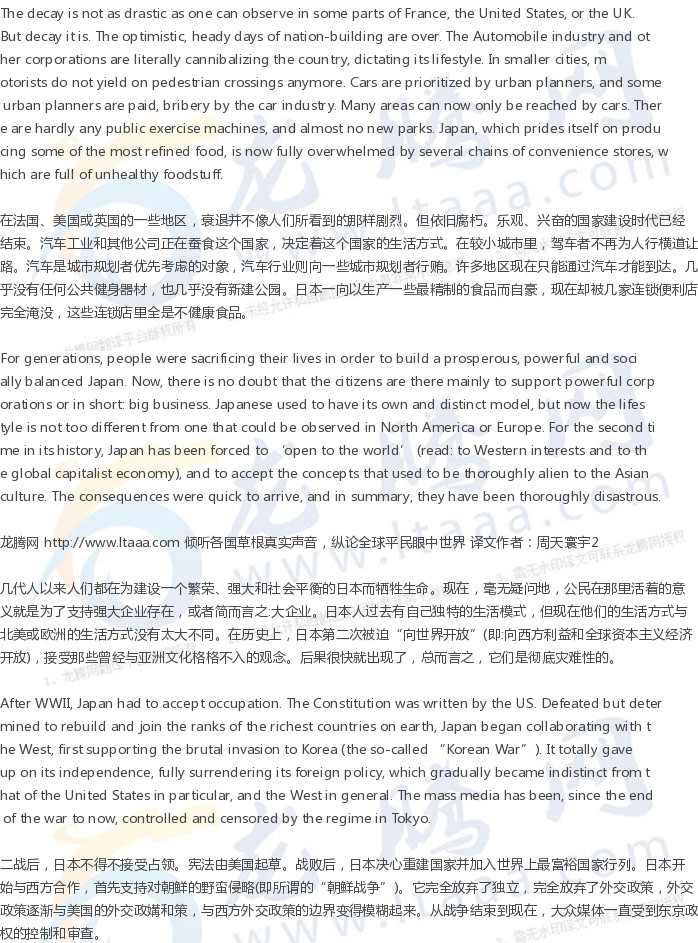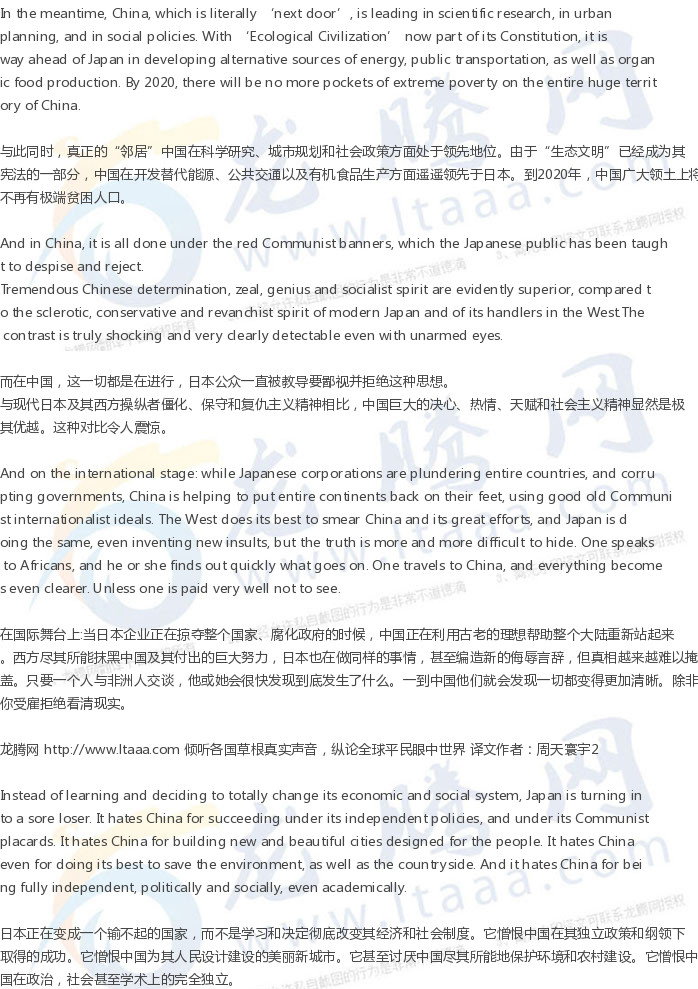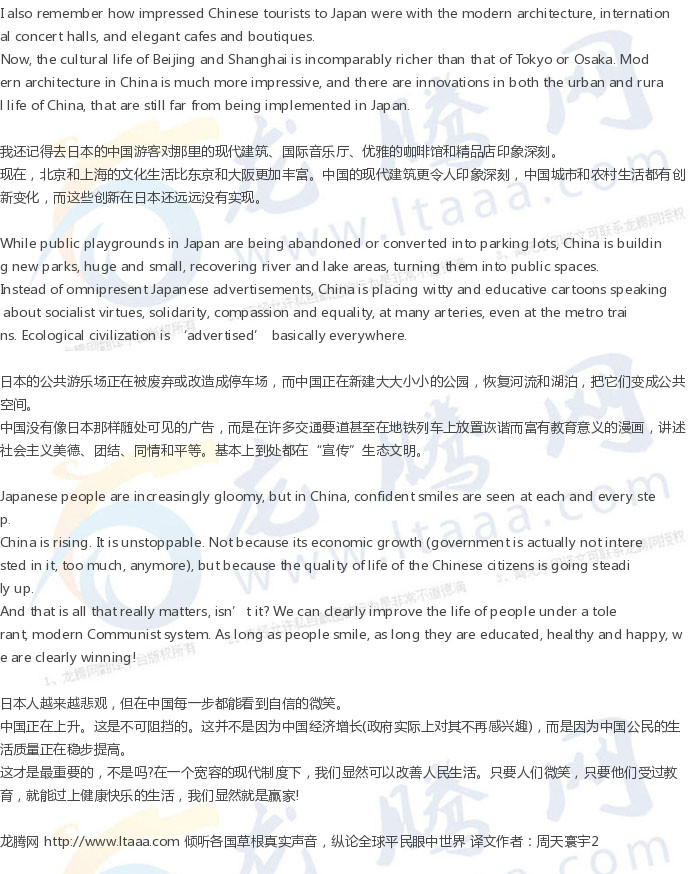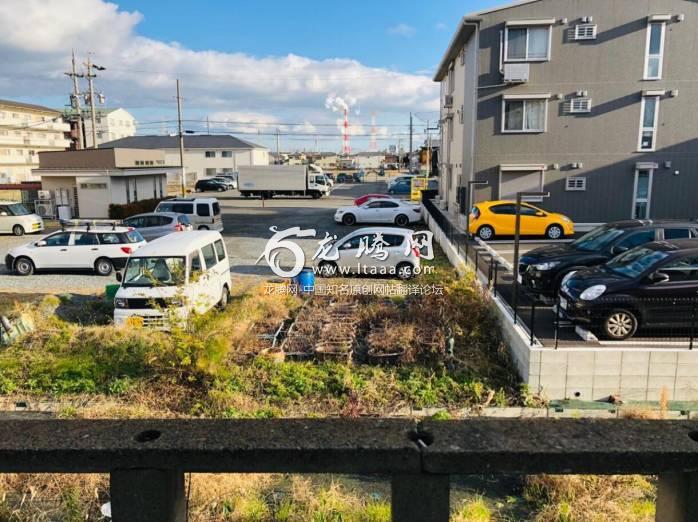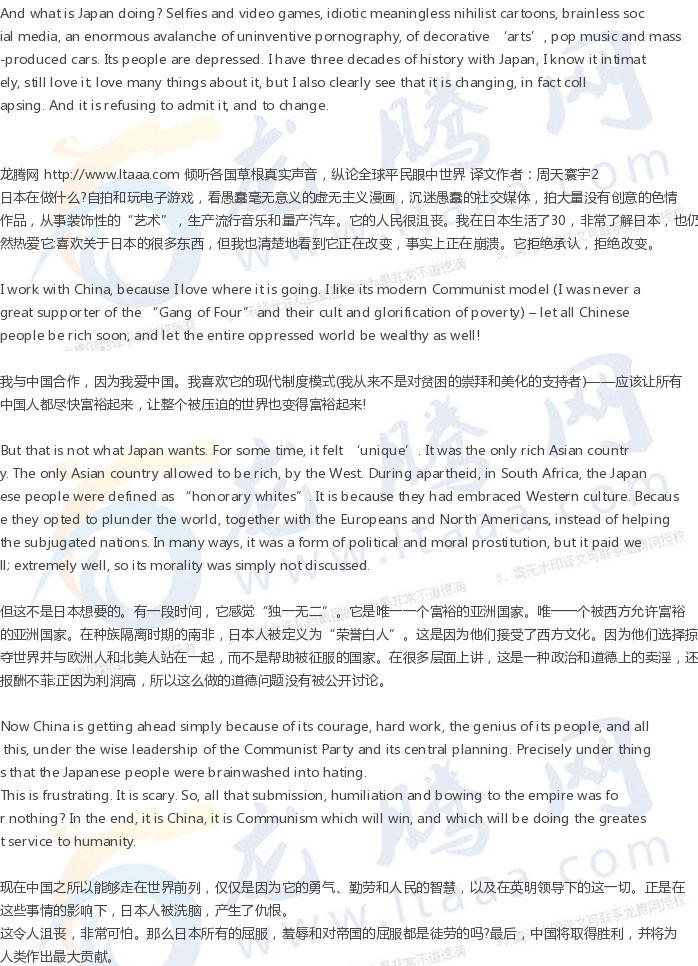为什么日本对中国势不可挡的崛起如此不满? [美国媒体]
日本三重县离一座古老村庙不远的地方,曾经有一对漂亮的秋千供孩子们玩耍。在那里,当我为自己的小说寻找灵感时,我经常去那里竞走。两年前我注意到秋千生锈被遗弃了,而且凌乱不堪。
Why Is Japan so Bitter About The Unstoppable Rise of China?
为什么日本对中国势不可挡的崛起如此不满?
There used to be a pair of beautiful swings for children, not far from an old rural temple in Mie Prefecture, where I used to frequently powerwalk, when searching for inspiration for my novels. Two years ago, I noticed that the swings had gotten rusty, abandoned, and unkempt. Yesterday, I spotted a yellow ribbon, encircling and therefore closing the structure down. It appears that the decision had already been made to get rid of the playground, irreversibly.
日本三重县离一座古老村庙不远的地方,曾经有一对漂亮的秋千供孩子们玩耍。在那里,当我为自己的小说寻找灵感时,我经常去那里竞走。两年前我注意到秋千生锈被遗弃了,而且凌乱不堪。昨天我发现上面系着一条黄色丝带把秋千围了起来。政府似乎已经做出不可逆转的决定,要把这片空地清理掉。
Homeless people are everywhere. Cars (Japan now has more cars per capita than the United States) are rotting in the middle of rice fields and at the edges of once pristine forests, as they lose value rapidly, and it costs a lot of money to get rid of them properly. Entire rural villages are being depopulated, in fact turning into ghost towns. There is rust, bad planning and an acute lack of anything public, all over the country.
到处都是无家可归的人。汽车(日本现在人均汽车数量比美国还多)正在稻田中央和曾经的原始森林边缘腐烂,因为它们正在迅速贬值,而且妥善处理它们需要花费大量金钱。整个日本农村人口正在减少,农村实际上变成了鬼城。全国到处都是铁锈,市政规划凌乱不堪,严重缺乏公共设施。
Japan is in decay. For many years, it was possible, with half-closed eyes, to ignore it, as the country was due to inertia hanging on to the top spot of the richest nations on Earth. But not anymore: the deterioration is now just too visible.
日本正在衰退。多年来,我们有意忽略了这个现实,因为这个国家由于惯性一直把持着世界上最富裕国家的榜首位置直到永远。但现在情况变了:正在急剧恶化。
Major Japanese newspapers, as well as the Japanese national broadcaster NHK, would never dare to broadcast or publish any important international news, unless at least one major US or British mainstream media outlet had set the tone and example of how the story should be covered by the mass media in the ‘client’ states. In this respect, the Japanese media is not different from its counterparts in countries such as Indonesia or Kenya. Japan is also definitely not a ‘democracy’, if ‘democracy’ simply means the rule of the people. Traditionally, Japanese people used to live mainly in order to serve the nation, which was perhaps not such a bad concept. It used to work, at least for the majority. However, now, they are expected to sacrifice their lives solely for the profits of corporations.
日本主要报纸,以及日本国家广播公司NHK绝不敢广播或发布任何重要国际新闻,除非至少有一个主要的美国或英国主流媒体已经定下了基调,并决定大众媒体应如何报道这一事件。在这方面日本媒体与印度尼西亚、肯尼亚等国媒体并无不同。如果“民主”仅仅意味着人民自治,那么日本也绝对不是一个“民主”国家。传统上,日本人的生活主要是为了服务国家,这也许不是一个坏的概念。它曾经奏效过,至少对大多数人来说是这样。然而,现在他们被期望为公司利益而牺牲自己生命。
People in Japan do not rebel, even when they are robbed by their rulers. They are shockingly submissive.
日本人不造反,即使他们被统治者抢劫。他们极其顺从。
Japan is not only in decay. It tries to spread its failure like an epidemy. It is actually spreading, and glorifying its submissive, subservient foreign and domestic policies. Through scholarships, it is continuously indoctrinating, and effectively intellectually castrating tens of thousands of willing students from the poor Southeast Asian nations, and other parts of the world.
日本不仅仅在衰落。它试图像传染病一样传播它的失败理念。它实际上是在传播并颂扬其顺从、追随西方的国内外政策。通过奖学金,它在不断向来自贫穷东南亚国家和世界其他地区的数万名学生灌输思想并进行智力阉割。
China tried ‘playing’ footsies with the Western academia, but the game almost turned deadly, leading to ideological infiltration and the near collapse of China’s intellectual independence. But at least the danger was identified, and the Western subversion was quickly stopped, just 5 minutes to Midnight so to speak; before it was too late.
中国曾试图“玩弄”西方学术界,但这场游戏几乎变成了一场致命的游戏并导致意识形态渗透。中国知识独立曾几近崩溃。但至少危险被识别出来了,西方的学术颠覆很快被制止了。可以说离崩溃只有5分钟了;但至少一切都还来得及。
In Japan, submission and collaboration with the Western global imperialist regime is worn as some code of honor. Japanese graduates of various US and UK universities frame their university diplomas and hang them on the wall, as if they’d symbolize great proof of their success, instead of collaboration with the system which is ruining almost entire planet.
在日本,顺从且与西方帝国主义政权合作被视为一种荣誉准则。来自美国和英国不同大学的日本毕业生将他们的大学文凭装裱起来挂在墙上,仿佛它们象征着他们的成功,而不是与正在毁灭几乎整个地球的体制合作。
I remember, some fifteen years ago, Chinese tourists would stand on the bullet train platforms all over Japan, with their cameras ready, dreaming. When train would pass, they’d sigh.
Now, China has the most extensive and the fastest bullet train network in the world. Their trains are also more comfortable and incomparably cheaper than the Japanese or French ones; priced so everyone can afford to travel.
我记得大约15年前中国游客站在日本各地的子弹头列车站台上,带着相机憧憬着美好生活。当火车经过时,他们会叹气。
现在中国拥有世界上范围最广、速度最快的子弹头列车网络。他们的火车也比日本和法国火车更舒适、更便宜;定价低廉,让每个人都能负担得起旅行。
Chinese women used to eye, sadly, the offerings of Japanese department stores. iPhones were what the middle class was dreaming of possessing. Now Chinese visitors to Japan are dressed as elegantly as the locals, iPhones are not considered a luxury, and actually, Huawei and other Chinese manufacturers are now producing better phones than Apple.
可悲的是中国女性过去常常盯着日本百货商店商品。Iphone曾是中国中产阶级梦寐以求的东西。现在来日本的中国游客穿着和当地人一样优雅,iphone也不被认为是奢侈品,实际上华为和其他中国制造商生产的手机比苹果更好。
Some individuals are still chasing those magic images of pristine Japanese forests and lakes. Yes, they are still there, if you search very hard. Tea rooms and trees, lovely creeks. But you have to work very hard, you have to edit and search for the perfect shots, as Japanese cities and countryside are dotted with rotten cars and weird metal beams, with unkempt public spaces, with ugly electric wires hanging everywhere. As long as money can be saved, as long as there is profit, anything goes.
一些人仍在追寻日本原始森林和湖泊的神奇景色。是的,它们还在那儿,如果你仔细找的话。茶室和树,可爱的小溪。但你必须非常努力工作,你必须编辑搜索才能调挑出完美的照片,因为日本城市和乡村到处都是腐烂的汽车和奇怪的金属梁,公共空间凌乱不堪,到处都挂着难看的电线。只要能保值只要有利润,什么都可以。
Japanese people find it hard to formulate their feelings on the subject. But in summary: they feel frustrated that the country they used to occupy and torture, is doing much better than their own. To Japanese imperialists, the Chinese were simply ‘sub-humans’. It is never pronounced, but Japan has only been respecting Western culture and Western power. And now, the Chinese ‘sub-humans’ are exploring the bottoms of the oceans, building airplanes, running the fastest trains on earth, and making wonderful art films. And they are set on liberating the oppressed world, through its ‘Belt and Road Initiative’, and through other incredible ideas.
日本人发现很难表达他们对这个问题的感受。但总而言之:他们感到沮丧的是他们曾经占领和折磨的国家现在比他们自己的要好得多。对日本帝国主义者来说,中国人只是“次等人”。这一点从未被提及,但日本一直在尊重西方文化和西方势力。现在身为的“亚人类”中国正在探索海洋大陆架,建造客运飞机,运行地球上最快的火车,制作精彩的艺术电影。他们决心通过“一带一路”解放受压迫的世界
Yes, Japan is frustrated. These days, polls speak of some 80% of the Japanese disliking the Chinese.
As I interact with people from all corners of Japan, I am getting convinced that the Japanese public subconsciously feels that, for decades, it has been betting on the ‘wrong horse’. It is too proud to verbalize it. It is too scared to fully reflect on it. But life in Japan, at least for many, is clearly becoming meaningless, gloomy and depressing. And there is no revolution on the horizon, as the country was successfully de-politicized.
China is building, inventing, struggling and marching forward, confidently, surrounded by friends, but independently.
Japan is tied up and restrained. It cannot move. It doesn’t even know how to move, how to resist, anymore.
And that is why Japan hates China!
是的,日本很沮丧。最近的民意调查显示,80%的日本人不喜欢中国人。
当我与来自日本各地的人们交流时,我越来越确信——日本公众潜意识里觉得几十年来他们一直在押错赌注。他们骄傲到无须赘述。他们害怕到无法反思。但日本的生活,至少对许多人来说显然正变得毫无意义、令人沮丧。随着这个国家成功地去政治化,目前革命还没有出现。
中国在建设,在发明,在奋斗,在前进,自信地,在朋友的簇拥下,且独立自主。
日本受到束缚和约束。它不能移动。它甚至不知道如何移动,如何抵抗。
这就是日本恨中国的原因!
版权声明
我们致力于传递世界各地老百姓最真实、最直接、最详尽的对中国的看法
【版权与免责声明】如发现内容存在版权问题,烦请提供相关信息发邮件,
我们将及时沟通与处理。本站内容除非来源注明五毛网,否则均为网友转载,涉及言论、版权与本站无关。
本文仅代表作者观点,不代表本站立场。
本文来自网络,如有侵权及时联系本网站。
图文文章RECOMMEND
热门文章HOT NEWS
-
1
Why do most people who have a positive view of China have been to ...
- 2
- 3
- 4
- 5
- 6
- 7
- 8
- 9
- 10
推荐文章HOT NEWS
-
1
Why do most people who have a positive view of China have been to ...
- 2
- 3
- 4
- 5
- 6
- 7
- 8
- 9
- 10
